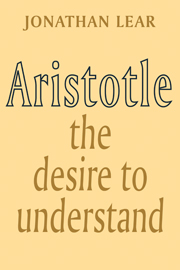4 - Man's nature
Published online by Cambridge University Press: 04 August 2010
Summary
Soul
Soul was traditionally thought to be a principle of living things. Soul was invoked above all, Aristotle says, to explain two remarkable features of animal life: the capacity for movement, and the capacity for cognition – perception and thinking. However, previous thinkers treated soul as an independent item, which they joined to a body without explaining how the two could be related. Aristotle thinks he can give an adequate account of soul and its relation to body by relying on his distinction between form and matter. He defines soul as ‘the form of a natural body having life potentially within it.’ Since the form of a living body is its nature, it turns out that soul is the nature of living things: the inner principle of change and rest.
Form is the actuality of a body, the matter a potentiality, so soul is the actuality of a living organism. However, Aristotle distinguishes different grades of actuality. Aristotle uses the distinction between having learned an organized body of knowledge (an epistēmē) and actually exercising that knowledge. It is fitting to think of one's knowledge as an actuality: for one has passed beyond the stage of merely being capable of learning, one has actually acquired the knowledge. There is nothing that is left which remains to be done in order to be able to exercise it at will. Nevertheless, this does not seem to be as high a level of actuality as the exercise of one's knowledge.
- Type
- Chapter
- Information
- AristotleThe Desire to Understand, pp. 96 - 151Publisher: Cambridge University PressPrint publication year: 1988



